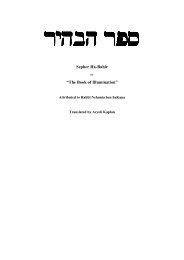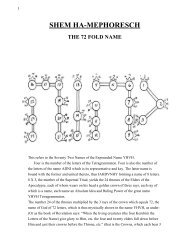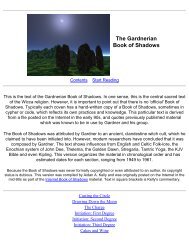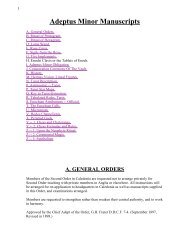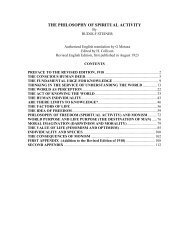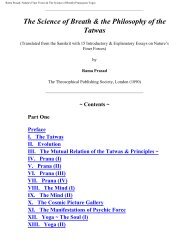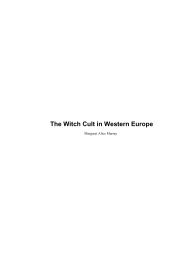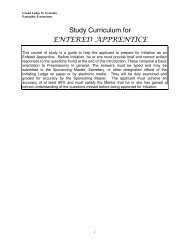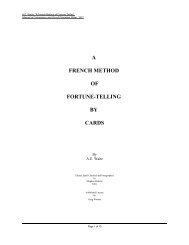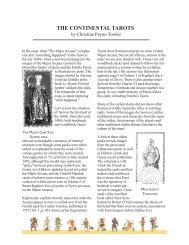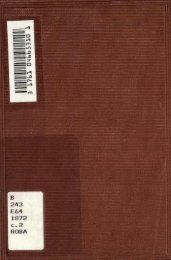Band 2 Anthropogenesis - H.P. Blavatsky
Band 2 Anthropogenesis - H.P. Blavatsky
Band 2 Anthropogenesis - H.P. Blavatsky
You also want an ePaper? Increase the reach of your titles
YUMPU automatically turns print PDFs into web optimized ePapers that Google loves.
is the spiritual, divine, and purified man, and Armaita Spenta, the Spirit of the Earth or materiality, is the same as Ahriman<br />
or Angra Mainyu in one sense.<br />
The whole of the Magian or Mazdean literature -- or what remains of it -- is magical, occult, hence allegorical and<br />
symbolical -- even its "mystery of the law" (see the Gatha in Yasna XLIV.). Now the Mobed and the Parsi keep their eye<br />
on the Baresma during the sacrifice, the divine twig off Ormazd's "tree" having been transformed into a bunch of metallic<br />
rods; and wonder why neither the Amesha-Spentas, nor "the high and beautiful golden Haomas, nor even their Vohu-<br />
Mano (good thoughts), nor their Rata (sacrificial offering)," help them much. Let them meditate on the "tree of Wisdom,"<br />
and study, assimilating one by one, the fruits thereof. The way to the tree of eternal life, the white Homa, the Gaokerena,<br />
is through one end of the earth to the other; and Haoma is in heaven as it is on earth. But to become once more a priest<br />
of it, and a healer, man must heal himself before he can heal others.<br />
This proves once more that the so-called "myths," in order to be at least approximately dealt with in any degree of justice,<br />
have to be closely examined from all their aspects. In truth, every one of the seven Keys has to be used in its right place,<br />
and never mixed with the others, if we would unveil the entire cycle of mysteries. In our day of dreary soul-killing<br />
materialism, the ancient priest Initiates have become, in the opinion of our learned generations, the synonyms of clever<br />
impostors, kindling the fires of superstition in order to obtain an easier sway over the minds of men. This is an unfounded<br />
calumny, generated by scepticism and uncharitable thoughts. No one believed more in Gods -- or, we may call them, the<br />
Spiritual and now invisible Powers, or Spirits,<br />
------------------------------------------------------------------------<br />
[[Vol. 2, Page]] 518 THE SECRET DOCTRINE.<br />
the noumena of the phenomena -- than they did; and they believed just because they knew. If, initiated into the Mysteries<br />
of Nature, they were forced to withhold their knowledge from the profane, who would have surely abused it, such secrecy<br />
was undeniably less dangerous than the policy of their usurpers and successors. The former taught only that which they<br />
well knew. The latter, teaching what they do not know, have invented, as a secure haven for their ignorance, a jealous<br />
and cruel Deity, who forbids man to pry into his mysteries under the penalty of damnation. As well they may, for his<br />
mysteries can at best be only hinted at in polite ears, never described. Turn to King's Gnostics, "Description of the Plates"<br />
(Plate H), and see for yourself what was the primitive Ark of the Covenant, according to the author, who says: "There is a<br />
Rabbinical tradition that the cherubin placed over it were represented as male and female, in the act of copulation, in<br />
order to express the grand doctrine of the Essence of Form and Matter, the two principles of all things. When the<br />
Chaldeans broke into the sanctuary and beheld this most astounding emblem, they naturally enough exclaimed, 'Is this<br />
your God, of whom you boast that He is such a lover of purity?' " (p. 441.)<br />
King thinks that this tradition "savours too much of Alexandrian philosophy to demand any credit," to which we demur.<br />
The shape and form of the wings of the two cherubim standing on the right and left sides of the Ark, these wings meeting<br />
over the "Holy of Holies," are an emblem quite eloquent in itself, besides the "holy" Jod within the ark! The Mystery of<br />
Agathadaemon, whose legend states, "I am Chnumis, Sun of the Universe, 700," can alone solve the mystery of Jesus,<br />
the number of whose name is 888." It is not the key of St. Peter, or the Church dogma, but the narthex -- the wand of the<br />
candidate for initiation -- that has to be wrenched from the grasp of the long-silent Sphinx of the ages. Meanwhile ----<br />
The augurs, who, upon meeting each other, have to thrust their tongues into their cheeks to suppress a fit of laughter,<br />
may be more numerous in our own age than they ever were in the day of Sylla.<br />
-------<br />
------------------------------------------------------------------------<br />
[[Vol. 2, Page]] 519 THE "FATHER OF MORTALS."<br />
§ XX.<br />
PROMETHEUS, THE TITAN.<br />
HIS ORIGIN IN ANCIENT INDIA.<br />
IN our modern day there does not exist the slightest doubt in the minds of the best European symbologists that the name<br />
Prometheus possessed the greatest and most mysterious significance in antiquity. While giving the history of Deukalion,<br />
whom the Boeotians regarded as the ancestor of the human races, and who was the Son of Prometheus, according to<br />
the significant legend, the author of the Mythologie de la Grece Antique remarks: "Thus Prometheus is something more<br />
than the archetype of humanity; he is its generator. In the same way that we saw Hephaestus moulding the first woman<br />
(Pandora) and endowing her with life, so Prometheus kneads the moist clay, of which he fashions the body of the first<br />
man whom he will endow with the soul-spark" (Apollodorus, I., 7, 1). After the Flood of Deukalion, Zeus, it was taught,<br />
had commanded Prometheus and Athena to call forth a new race of men from the mire left by the waters of the deluge<br />
(Ovid, Metam. 1, 81. Etym. M. v. [[Prometheus]]); and in the day of Pausanias the slime which the hero had used for this<br />
purpose was still shown in Phocea (Paus. x, 4, 4). "On several archaic monuments one still sees Prometheus modelling a<br />
human body, either alone or with Athena's help" (Myth. Grece Ant. 246).<br />
The same authors remind the world of another equally mysterious personage, though one less generally known than<br />
Prometheus, whose legend offers remarkable analogies with that of the Titan. The name of this second ancestor and<br />
generator is Phoroneus, the hero of an ancient poem, now unfortunately no longer extant -- the Phoronidae. His legend<br />
was localized in Argolis, where a perpetual flame was preserved on his altar as a reminder that he was the bringer of fire<br />
upon earth (Pausanias, 11, 19, 5; Cf. 20, 3.) A benefactor of men as Prometheus was, he had made them participators of<br />
every bliss on earth. Plato (Timaeus, p. 22), and Clemens Alexandrinus (Strom. 1, p. 380) say that Phoroneus was the<br />
first man, or "the father of mortals." His genealogy, which assigns to him as his father Inachos, the river, reminds one of<br />
that of Prometheus, which makes that Titan the son of the Oceanid Clymene. But the mother of Phoroneus was the<br />
nymph Melia; a significant descent which distinguishes him from Prometheus.




